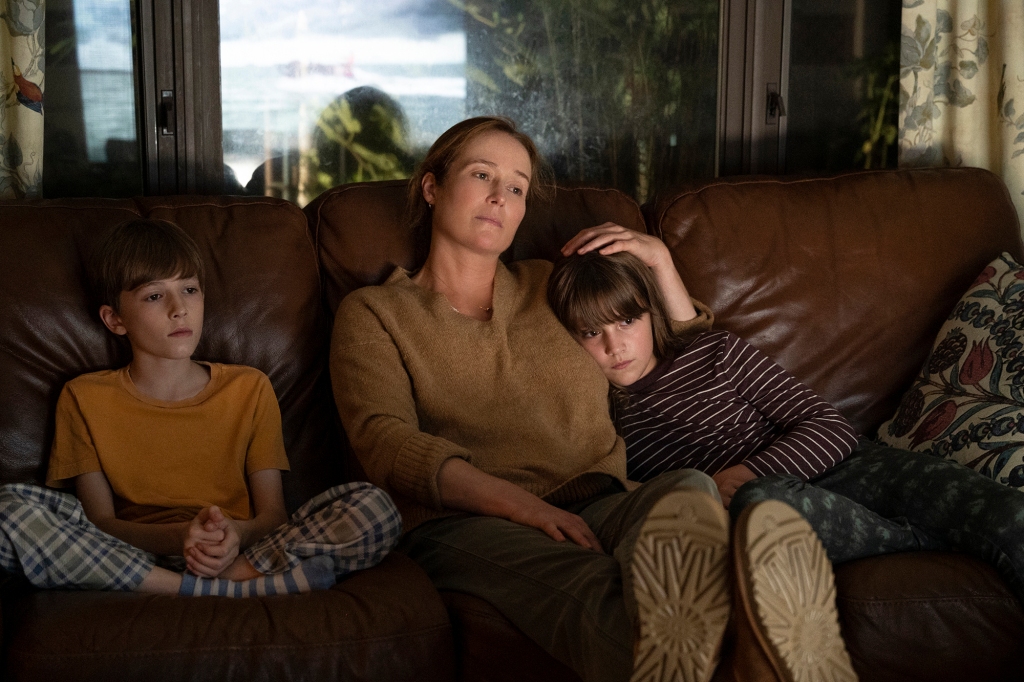the Harvey Weinstein movie nobody wants
The investigation drama “She Said,” about the two New York Times reporters who broke the Harvey Weinstein sexual misconduct story in 2017, is a watershed moment for journalism movies.
Because it’s a bore.
Running time: 128 minutes. Rated R (language and descriptions of sexual assault.) In theaters Nov. 18.
Directed by Maria Schrader, the film that’s part of one of the most reliably galvanizing genres — newspaper reporters doggedly chasing down a tough story — is a disappointing, sleepy metronome with made-for-TV diminutiveness.
Gone is the gripping scrappiness of “All the President’s Men” and “Spotlight,” or on the fictional side, the seedy mischief of “His Girl Friday” and “The Paper.” And in their place are rigidly followed procedures and expensed international flights.
Yes, rules plus gumption is the way Jodi Kantor and Megan Twohey landed their bombshell exposé that revealed the disgraced movie producer’s grotesque behavior and jolted the #MeToo movement. However, their tale, as told here, is not compellingly cinematic enough to warrant the big screen treatment. Nor is it particularly informative. Since we’ve all read plenty about Weinstein, there isn’t much new detail to absorb. “She Said” is the stuff of memoirs, not movies.
The fruitless film attempts to mine depth by illuminating Kantor (Zoe Kazan) and Twohey’s (Carey Mulligan) personal lives outside the Times. And it does a mediocre job of that. Both are mothers and are pushed to the limits at home by a hard-to-crack story with potentially massive repercussions.
Twohey, at the start, is regularly threatened for her reporting on Donald Trump. Kantor, meanwhile, finds her growing and curious daughter asking difficult questions about what she does. Still, we never really get to know them beyond defining traits (Twohey, cool and seasoned; Kantor, eager and open-hearted). Kazan’s performance, at least, has some soul. Mulligan is robotic.
After getting a tip about Weinstein, the pair quietly meet many nervous sources who worked with the producer and his company Miramax, had a bad experience with him and are reluctant and scared to be named — or signed NDAs. The interviews with Ashley Judd (she actually appears as herself), Rose McGowan (she doesn’t) don’t ring true. The phone calls all sound fake and recited. The in-person talks with traumatized former assistants all have more punch.

When the movie is most intriguing is as it shows Twohey and Kantor’s divergent tactics to get sources to trust them and open up.
The subjects’ traumatic recollections are all similar, revealing a pattern of behavior by the producer — inviting young women up to his hotel room, asking for a massage and then taking things aggressively further. Even though the speeches are repetitious, Jennifer Ehle as Laura Madden and Samantha Morton as Zelda Perkins are moving as their hardened exteriors break down.

The British actresses pop against an unsightly film.
Every scene is in a drab coffee shop, or a nondescript oddly empty restaurant, or a shadowy hotel room, or the sterile newsroom with their editor Rebecca Corbett (Patricia Clarkson) and executive editor Dean Baquet (Andre Braugher). Schrader and cinematographer Natasha Braier shoot these spaces in a manner neither realistically gritty nor stylized. Like a cellphone picture with bad lighting.
The movie is all iPhones and emails, and stone-faced writers saying “off the record” and “on background” over and over again. That all-paperwork-and-no-play reality might be true, but then why lazily dramatize it?
When Kantor and Twohey finally have gathered sufficient reporting to run the story, and the editor’s mouse cursor hovers over the word “publish,” our hearts aren’t beating out of our chests in anticipation. “She Said” peters out — the opposite of what happened in real life.
The filmmakers, it would seem, decided that their subject matter was too worthy and important to make legitimately thrilling.
Read the full article Here


